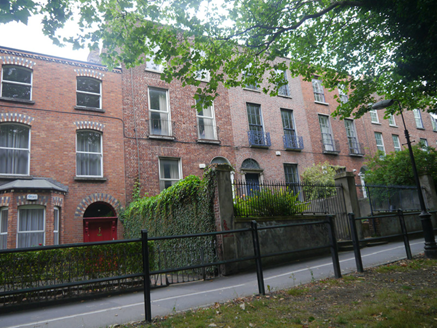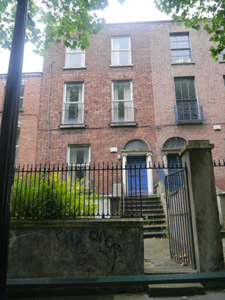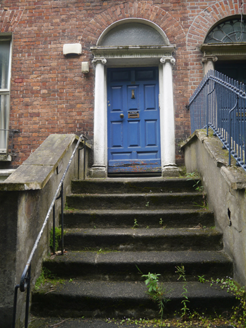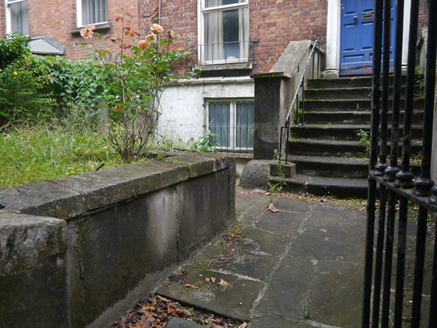Survey Data
Reg No
50130181
Rating
Regional
Categories of Special Interest
Architectural, Artistic
Original Use
House
Date
1750 - 1790
Coordinates
316068, 236348
Date Recorded
23/07/2018
Date Updated
--/--/--
Description
End-of-terrace two-bay three-storey house over raised basement, built c. 1770 forming south end of row of three, with single-storey return to rear. Vacant at time of survey (August 2018). M-profile hipped slate roof with clay ridge and hip tiles, concealed by brick parapet with stone coping; two rendered masonry chimneystacks to south wall with yellow clay pots. Red brick walling, laid in Flemish bond, over painted masonry plinth course and smooth-rendered basement walling. Square-headed window openings with brick jack-arches, unpainted rendered reveals, granite sills and replacement uPVC windows, with simple wrought-iron window-guards to first floor. Round-headed doorway with brick voussoirs, patent reveals, stone doorcase with engaged Ionic columns with entasis and entablature, plain fanlight, and timber door having eight raised-and-fielded panels, accessed by flight of eight stone steps flanked by rendered masonry walls with stone copings, that to north forming boundary wall with adjacent property and topped by wrought-iron railings. Garden to front, enclosed by rendered plinth wall with wrought-iron railings having pointed finials; full-height wrought-iron pedestrian gate with flat iron overthrow hung from masonry pier to north shared with adjoining property. Enclosed garden to rear. Located on tree-lined section of Drumcondra Road Lower.
Appraisal
An elegant house terminating the south end of a group of three mid- to late eighteenth-century houses on the west side of Drumcondra Road, and attached at south to a later Georgian terrace with lower parapet height, set back behind a tree-lined buffer that separates them from the busy main thoroughfare. The terrace is representative of the style and proportions of Georgian residential building in Dublin, although it is distinguished from the generally later nineteenth-century urban grain of the Drumcondra suburbs. Although less decorative than others in the group, the full-height wrought-iron gates and railings enclosing the front plot form a particularly notable feature of both groups of buildings. Together they make a strong contribution to the architectural quality and variety of the Drumcondra area.







